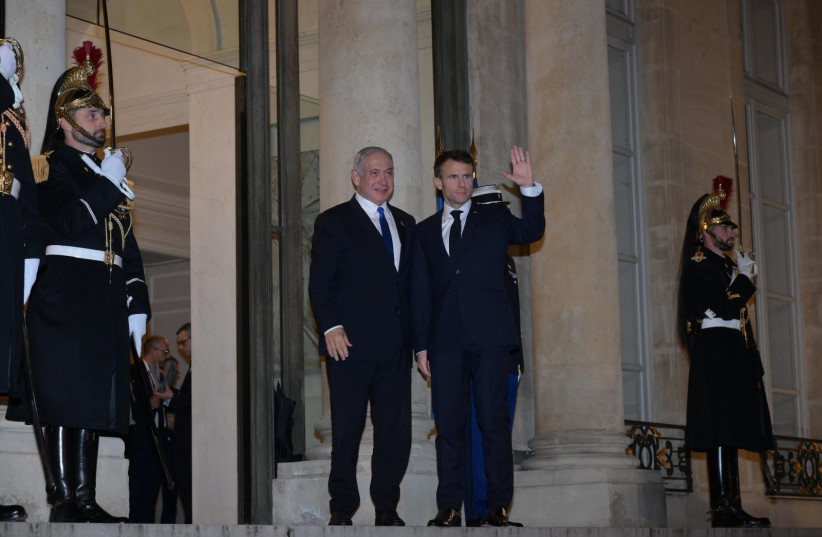Israeli peace with Arab and Muslim nations is incomplete without renewed negotiations with the Palestinians toward a two-state solution, French President Emmanuel Macron told Prime Minister Benjamin Netanyahu when the two men spoke in Paris on Thursday night.
“The process will remain incomplete unless it is accompanied by the resumption of a political process towards a solution addressing the legitimate aspirations of both Palestinians and Israelis.,” Macron told Netanyahu during their meeting, according to a statement released by the Elysee Palace.
The two men met just after Chad, an African country with a Muslim population, opened an embassy in Ramat Gan, five years after the two nations restored diplomatic ties which had been severed in the 1970s in the aftermath of the Six-Day War.
As Netanyahu traveled to the Elysee Palace, Israel’s Foreign Minister Eli Cohen returned from what had initially been a secret trip to Khartoum, where he secured Sudan’s agreement to finalize its participation in the US-brokered Abraham Accords initiated in 2020.
Sudan has lagged behind the other Abraham Accord partners — the United Arab Emirates, Bahrain and Morocco — in its participation in the accords and has yet to sign the deal, despite committing to the process.

Netanyahu told Israeli reporters in Paris that the he had spoken with Macron at length about the possibility of a normalization deal with Saudi Arabia. Such a deal is possible, Netanyahu told Macron, “but it depends on the Saudis.” Such a historical deal would have a positive impact on the region and in the end, would also help inspire the Palestinians to end their conflict with Israel, he added.
They spoke about Chad’s battle against the fires of radicle Islam and about the importance of stabilizing Lebanon, Netanyahu said. Chad and Lebanon had once under French control and France retains a strong connection to them.
Opposition to settlement activity
The push forward in Israel’s ties with Arab and Muslim states comes amid heightened tensions with the Palestinians. That conflict has created discord between Netanyahu and the West, particularly given the anti-Palestinian stances of his ultra-right government, the rising violence as well as the Palestinian Authority’s decision to suspend security ties with Israel.
Macron voiced some of those concerns during his meeting with Netanyahu, adding that it was important for Israel to avoid taking steps that would “fuel the cycle of violence” and he underscored his support for the status quo on the Temple Mount, known to Muslims as al-Haram, al-Sharif.
Netanyahu spoke with Macron about potential upcoming moves to strengthen West Bank settlements, a step that is very important to his coalition partners, according a report on KAN News.
The French President emphasized his “strong opposition to the continued settlement activity which is undermining both the prospect of a future Palestinian State and hopes of peace and security for Israel,” the Elysee Palace stated.
Netanyahu also emphasized that Israel was working to crack down on terror, but was not imposing collective punishment on Palestinian. It’s actions, he said, are designed to deter attack or to targeted individual terrorists and their immediate circle.
Israeli officials have downplayed statements by international leaders such as Macron about a renewed push for a two-state resolution to the conflict, noting that there is wide understanding that the circumstances are not right for this to occur, particularly given the internal Palestinian reality.
The visit comes amid a heightened level of conversation around the rising Israeli-Palestinian violence, with US Secretary of State visiting the region earlier in the week, with stops in Cairo, Jerusalem and Ramallah.
“The process will remain incomplete unless it is accompanied by the resumption of a political process towards a solution addressing the legitimate aspirations of both Palestinians and Israelis.”
Macron to Netanyahu
Netanyahu flew to Amman last week to speak with Jordan’s King Abdullah, with the monarch then visiting Washington this week where he met both with Blinken and US President Joe Biden.
Two senior state department officials remain in the region, including Assistant Secretary of State for Middle Eastern Affairs Barbara Leaf and the State Department’s special representative for Palestinian Affairs Hady Amr.
At issue in particular is concern that the upcoming combination of Ramadan and the Passover holiday with spark an additional increase in Israeli-Palestinian violence, including around issues to do with the Temple Mount.
State Department spokesman Ned Price who traveled with Blinken to the Middle East told reporters in Washington on Thursday that “stemming the violence.. our overarching goal is to support the de-escalation of tensions and to work with the parties to take action again to lessen the violence.”
